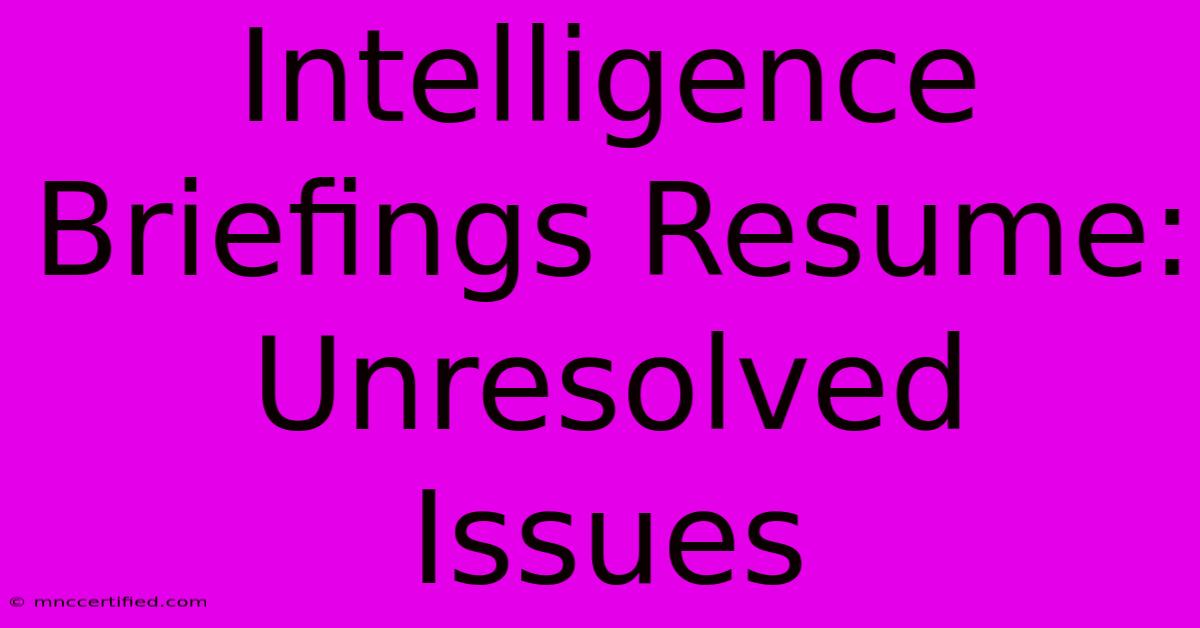Intelligence Briefings Resume: Unresolved Issues

Table of Contents
Intelligence Briefings Resume: Unresolved Issues
Landing that dream job in intelligence requires a compelling resume that showcases your unique skills and experience. However, simply listing your accomplishments isn't enough. Many intelligence professionals struggle with effectively communicating the nuances of their work on a resume, often leaving unresolved issues that hinder their chances of success. This article addresses common pitfalls and offers strategies for crafting a resume that truly highlights your capabilities in the competitive intelligence field.
Common Unresolved Issues in Intelligence Briefing Resumes
Many intelligence briefing resumes suffer from a few key weaknesses:
1. Lack of Specificity and Quantifiable Results:
Intelligence work often involves sensitive information, leading to vague descriptions. Instead of stating "Provided intelligence briefings," quantify your impact. For example, "Provided daily intelligence briefings to senior leadership, resulting in a 15% improvement in decision-making accuracy." Use metrics whenever possible to demonstrate the value of your contributions.
2. Overuse of Classified Terminology:
Using classified jargon on your resume is a significant mistake. Recruiters may not understand these terms, and including them could raise red flags about your discretion. Translate your accomplishments into clear, concise language that anyone can understand.
3. Failure to Highlight Transferable Skills:
Intelligence analysts possess a wealth of transferable skills, including research, critical thinking, problem-solving, and communication. Actively identify and showcase these skills even if you can't explicitly mention specific projects due to security concerns. Use action verbs and quantify your achievements to demonstrate proficiency.
4. Poor Keyword Optimization:
Intelligence agencies use Applicant Tracking Systems (ATS) to screen resumes. Optimize your resume with relevant keywords found in job descriptions. This includes terms like "intelligence analysis," "briefing preparation," "threat assessment," "risk mitigation," "data analysis," "geopolitical analysis," "open-source intelligence," "HUMINT," "SIGINT," and other relevant keywords specific to your field.
5. Ignoring the Importance of Formatting and Design:
A poorly formatted resume can easily be overlooked. Use a clean, professional template and ensure your resume is easy to read and visually appealing. Use consistent formatting and a clear, concise writing style.
Strategies for Addressing Unresolved Issues
Here are effective strategies to overcome these challenges and create a powerful intelligence briefing resume:
1. Focus on Impact, Not Just Tasks:
Instead of listing your responsibilities, focus on the outcomes you achieved. Use the STAR method (Situation, Task, Action, Result) to describe your accomplishments. This structured approach helps quantify your impact and demonstrate your skills effectively.
2. Use Action Verbs and Quantifiable Metrics:
Start each bullet point with a strong action verb (analyzed, developed, coordinated, implemented, etc.) and follow it with quantifiable results. For example, instead of "Prepared briefings," write "Prepared and delivered 20+ weekly intelligence briefings to executive leadership, resulting in proactive mitigation of three significant security threats."
3. Translate Classified Terminology into Civilian Language:
If you're unsure how to translate classified terms, use synonyms or alternative phrasing that conveys the same meaning without revealing sensitive information. Focus on the skills you used and the results you achieved.
4. Highlight Transferable Skills:
Create a dedicated "Skills" section showcasing your transferable skills. Use keywords relevant to both intelligence and other fields. This demonstrates versatility and adaptability.
5. Tailor Your Resume to Each Job Application:
Each job posting is unique. Customize your resume to match the specific requirements and keywords of each job description. This demonstrates your genuine interest and increases your chances of getting noticed.
6. Proofread Carefully:
Errors can undermine your credibility. Thoroughly proofread your resume for grammar, spelling, and punctuation errors. Ask a friend or colleague to review it as well.
Conclusion: Crafting a Winning Resume
Crafting a compelling resume in the intelligence field requires careful planning and attention to detail. By addressing the unresolved issues outlined in this article and implementing the strategies provided, you can create a resume that effectively showcases your unique skills and experience, significantly increasing your chances of securing that coveted position. Remember, your resume is your first impression – make it count!

Thank you for visiting our website wich cover about Intelligence Briefings Resume: Unresolved Issues. We hope the information provided has been useful to you. Feel free to contact us if you have any questions or need further assistance. See you next time and dont miss to bookmark.
Featured Posts
-
Chubb Leads Browns Past Steelers
Nov 22, 2024
-
Reverend Coless Itv Health Scare
Nov 22, 2024
-
Food Science Summer School Penn State
Nov 22, 2024
-
Nil Offers Lsu Football Vs Michigan
Nov 22, 2024
-
Veteran Journalist Ken Reid Passes
Nov 22, 2024